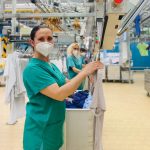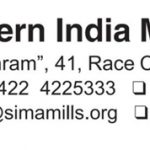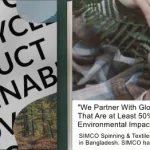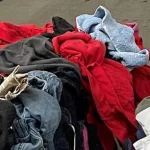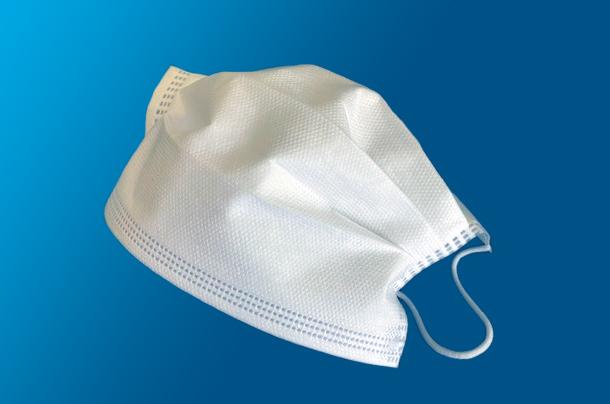 Berlin – It seems that one-way is experiencing a renaissance in times of Corona. Throwing away is booming. Disposable masks can already be found in the oceans. Many reusable textile products meet the same hygiene requirements. The German Textile Cleaning Association (DTV) points out that misunderstood hygiene requirements could bring the throw-away mentality back into fashion. Reusable products – especially made from reusable textiles – offer many environmental advantages compared to disposable or single-use products and are at least as hygienic, according to the DTV.
Berlin – It seems that one-way is experiencing a renaissance in times of Corona. Throwing away is booming. Disposable masks can already be found in the oceans. Many reusable textile products meet the same hygiene requirements. The German Textile Cleaning Association (DTV) points out that misunderstood hygiene requirements could bring the throw-away mentality back into fashion. Reusable products – especially made from reusable textiles – offer many environmental advantages compared to disposable or single-use products and are at least as hygienic, according to the DTV.
Single use of reusable hygienic masks creating waste crisis
Regardless of whether it is disposable capes at the hairdresser’s, disposable napkins in restaurants, paper towels in washrooms or disposable surgical textiles – the corona crisis has long led to the advance of disposable products that are recognized as environmentally harmful. One result of the corona crisis is growing mountains of rubbish and more environmental pollution. The sustainable use of scarce resources and the implementation of environmental policy goals must not be neglected, demands the German Textile Cleaning Association (DTV) in a position paper.
 “In times of plastic garbage islands in the sea, the climate crisis and increasing resource consumption, single-use products are the wrong approach,” says Andreas Schumacher, managing director of the industry association. “Reusable and circular products are the order of the day, even in times of the Corona. Professionally maintained, hygienically prepared and reusable textiles pollute the environment far less than single-use products and meet the same hygiene requirements ”.
“In times of plastic garbage islands in the sea, the climate crisis and increasing resource consumption, single-use products are the wrong approach,” says Andreas Schumacher, managing director of the industry association. “Reusable and circular products are the order of the day, even in times of the Corona. Professionally maintained, hygienically prepared and reusable textiles pollute the environment far less than single-use products and meet the same hygiene requirements ”.
Reusable Is Active Environmental Protection
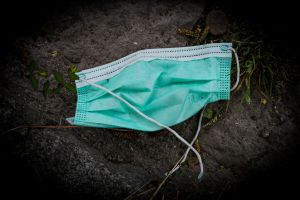 “An important key factor in protecting the environment and resources is the service life of products. Reuse, repair, recycle and then back into the cycle – that is the goal, ”says Schumacher. Reusable textile products can be used and processed up to 100 times instead of just once. “Reusable solutions are not only sustainable, they also strengthen the regional economy and secure local jobs. Instead of importing disposable products from a distance, textiles should be procured and processed through regional service providers, ”demands Schumacher.
“An important key factor in protecting the environment and resources is the service life of products. Reuse, repair, recycle and then back into the cycle – that is the goal, ”says Schumacher. Reusable textile products can be used and processed up to 100 times instead of just once. “Reusable solutions are not only sustainable, they also strengthen the regional economy and secure local jobs. Instead of importing disposable products from a distance, textiles should be procured and processed through regional service providers, ”demands Schumacher.
Well-traveled and unnecessarily packaged single-use products with supply chains all over the world are prone to delivery interruptions in pandemic situations – as recently shown by the supply shortages for single-use masks and protective equipment. Regional textile service providers guarantee short transport routes, ensure less packaging material and ensure continuous supply even in the event of a pandemic.
Green New Beginning After Corona
Governments across Europe are currently putting together aid packages to support the economy. At the same time it is discussed how this should be done. During the corona pandemic, the climate crisis fades into the background, the planned “Green Deal” and the EU’s circular economy action plan are practically on hold. But right now there is an opportunity to rebuild the economy in a climate-friendly way, according to DTV. With their reusable and repairable textile products, textile service providers make a significant contribution to resource conservation and environmental protection. In a joint position paper with the European umbrella association for textile leasing, the European Textile Services Association (ETSA), the DTV calls for the new economic start after Corona to be used.
Hygiene Service Provider For Many Industries
“The textile service providers were reliable experts in hygiene even before Corona. The preparation by professional textile cleaners ensures hygiene to the same extent as with single-use products. So if we have the choice between hygienic recycling products and hygienic disposable products: what should the choice be? ”, Says Schumacher.
Professional textile service providers supply customers from a wide variety of sectors – from hospitals and nursing homes to hotels, industry, trade, craft and private customers – with clean and hygienically prepared work clothing and many other textiles. Millions of professionals, hospitals, hotels and care facilities depend on textile service providers. The products include reusable protective textiles, such as surgical textiles and masks or protective equipment, table linen, bed linen and terry towels and, last but not least, the cloth towel dispensers or mouth-nose masks.

